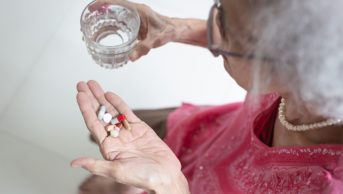
Shutterstock
Non-pharmacological treatment should be favoured over drugs for the management of agitation and aggression in patients with Alzheimer’s disease, according to global experts in the behavioural and psychological symptoms of dementia.
In research led by the University of Exeter, Johns Hopkins University and the University of Michigan, experts ranked assessment and management of underlying causes as the most important approach to treating the behavioural and psychological symptoms of dementia and agitation, which, according to the research paper, occur in around 20% of people with Alzheimer’s disease in contact with clinical services or living in the community[1]
.
Furthermore, four targeted non-pharmacological approaches — caregiver training, adaptation of the environment, person-centred care, and tailored activities — were prioritised for the behavioural and psychological symptoms of dementia and agitation prior to considering a pharmacological approach, highlighting the importance, and value of non-drug approaches.
Among pharmacological strategies, the experts ranked the antidepressant citalopram highest, at number six, followed by analgesia, for treating pain. Both were prioritised over the antipsychotic medication, risperidone.
In contrast, for the treatment of psychosis, the experts agreed that pharmacological treatment, specifically risperidone, should be prioritised following an assessment of the underlying causes.
The paper said the focus on nondrug approaches was supported by “robust evidence” from recently published, large clinical trials.
The panel consisted of 11 experts from across the globe, with representation from Europe, the United States, Australia and Canada.
Two tailored nondrug approaches, DICE (describe, investigate, evaluate and create) and music therapy, were agreed as the most promising future treatments for agitation, with dextromethorphan/quinidine given as the most promising potential pharmacologic candidate.
References
[1] Kales H, Lyketsos C, Miller E et al. Management of behavioral and psychological symptoms in people with Alzheimer’s disease: an international Delphi consensus. International Psychogeriatrics 2018. doi: 10.1017/S1041610218000534


